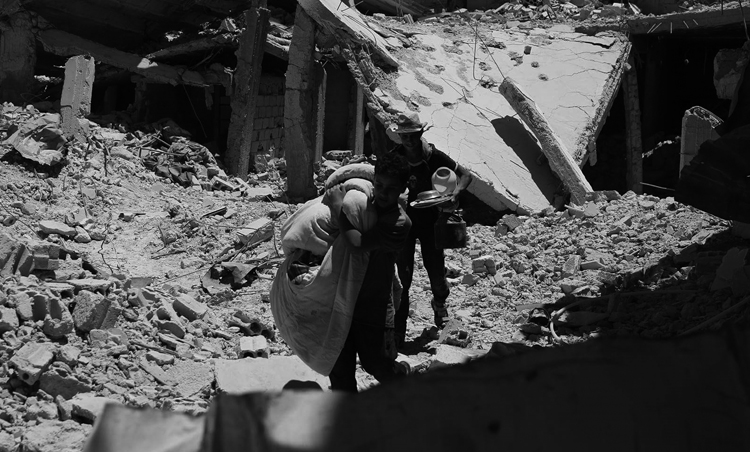Preface: The frequency of killing civilians throughout Daraa and its countryside increased dramatically during the recent months, as insecurity, the significant proliferation of weapons and the ease of access to them contributed in increasing the situation. Let alone the calm military operations between Syrian regular forces and armed Syrian opposition factions following the conclusion of the de-escalation agreement on July 9, 2017. However, the killings that spread throughout Daraa had various direct reasons, some of which were the result of a family dispute; others were for the purpose of theft, Syrians for Truth and Justice-STJ reporter said. This report deals with six murders from various areas in Daraa from July22, 2017 to August 1, 2017.
First: Abduction and Murder in Tafas, South of Daraa
1 August 2017, a young man identified as Muwafaq Mohammed al-Bardan, from Tafas, was shot dead directly in the heart; his body was found handcuffed and dumped on Jasim-Tafas Road near the ash-Shammari Olive Press. Until the writing of the present report, the murderer has not been identified, according to Adam Tibi, an activist of Tafas, who testified to STJ:
“Muwafaq was a farmer and was known as "Muwafaq al-Karimeh" as he had good reputation and no political or military affiliation. On the evening of August 1, 2017, he was abducted by anonymous people while he was heading to his farm on the outskirts of Tafas. When his family later were informed of his murder, they hastened to file a complaint to the courthouse in Horan aiming to find the murderer, but until this moment, there are no developments regarding knowing the murderer.”
The military junta[1] in Tafas manages the security file within the city and most of the problems are solved within the military junta, but the homicide files are referred to the courthouse[2] for investigation and arrest of the accused with the assistance of the military junta.
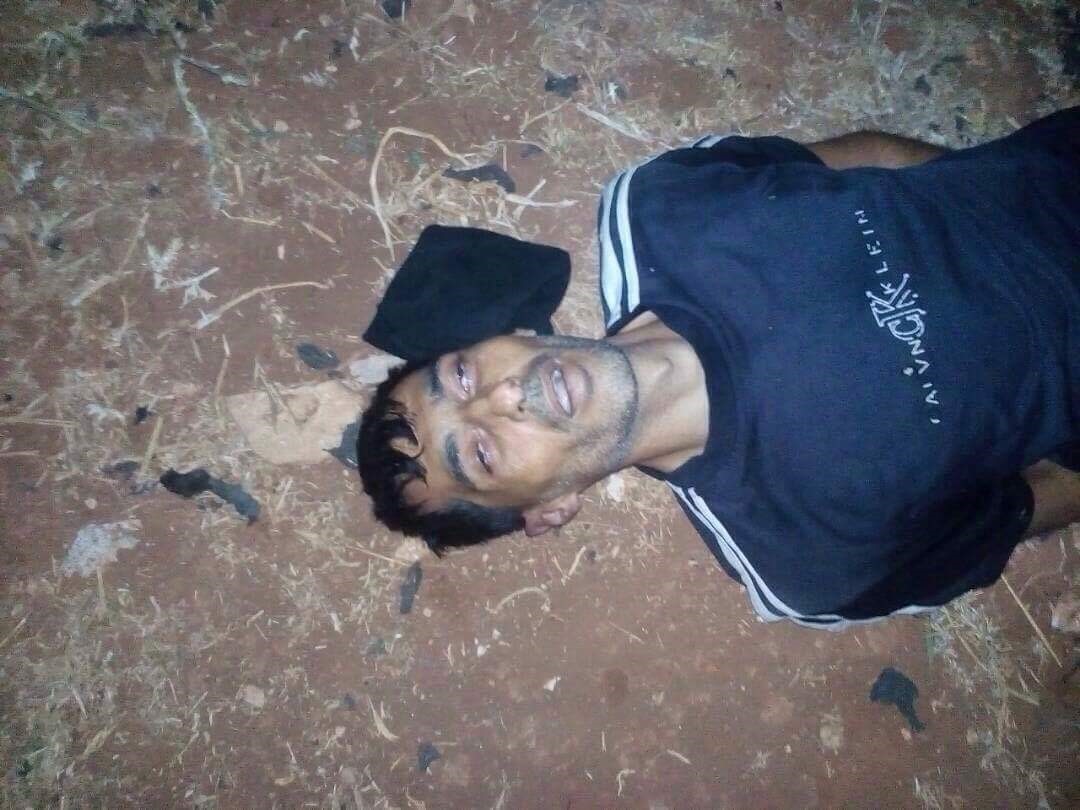
Image of the victim Muwafaq Mohammed al-Bardan following finding his body handcuffed and dumped on Jasim-Tafas Road on August 1, 2017.
Photo Credit: Activists from the city
Second: Due to a Family Dispute, a Young Man Shots his Father
July28, 2017, a horrific crime occurred in Mhajjah in the north countryside of Daraa. A young man identified as Ghazi al-Eid launched several bullets to his father, Mohammed al-Eid, killed him in his home and in front of his younger brothers. In this regard, Abu Kifah, a resident from the neighborhood where the victim Mohammed al-Eid, also known as Abu Wasim, lived, indicated that family disputes were the reason to end the life of his neighbor who descended from Nawa; he was a husband of two women and a father of nine children. Abo Kifah continued saying:
“A few years ago, a great dispute emerged in Abu-Wasim’s family, and none of the inhabitants of the town left but heard of it. As I recall once how his first wife said that she was intent on poisoning him to get rid of him because he so much offended and insulted her, and how we intervened with the rest of the neighbors to end their dispute. But on Friday evening, July 28, 2017, we heard the sound of firing three bullets coming from the house of our neighbor Abu-Wasim, followed by screaming of the children. We hurried immediately to our neighbor Abu-Wasim’s house, as soon as we entered, we were shocked by blood covering his body as the bullets hit his chest and ended his life. When we asked what happened, his young sons told us that their brother Ghazi killed their father after a quarrel broke out between them.”
STJ reporter said that on the very day that the victim Mohammed al-Eid died, his son Ghazi surrendered himself to the security committee located in Mhajjah. Then his mother headed to the headquarters of the security committee to demand the release of her son and the abolition of the right of her dead husband, arguing that her husband was always beating her and her children as well as cursing them. However, a member of the security committee told STJ reporter that the investigation is still underway with the son Ghazi, and he will not be released currently.
In a related context, the committee responsible for the security file in Mhajjah is a security committee composed of several elements of the opposition factions[3] within the town, whose work does not amount to the required standard because of the nepotism and clan relations that control the joints of life there. Besides, there is no communication between them and the courthouse because of the siege imposed on the town by the Syrian regular forces.
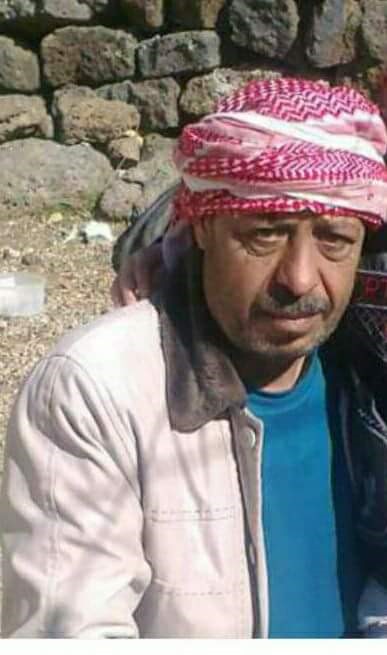
Image of the victim, Mohammed al-Eid prior to his murder with a bullet by his son Ghazi on July 28, 2017.
Photo Credit: Activists from Mhajjah
Third: Because of Dealing with Magic, a Young Man Murdered his Mother then Distorted her Body
The murder of Mohammed al-Eid coincided with another horrific crime conducted in the village of Qita, located in the western countryside of Daraa province controlled by the Syrian regular forces. A young man killed his mother, Iman Samir ash-Sharifeh, on the pretext of magic and inability to control himself, according to the testimony of Mohammed Abu al-Saud, a resident of the village who witnessed that crime. The villagers heard a scream came from the victim's house at about 11 p.m. on July28, 2017, they find out later that her only son identified as Mohammad, 19, had killed his mother on top of the house, cut her body and washed it with water, in order sacrifice to devil, as the son described, however Abu Saud added:
“As soon as we heard the victim’s screams, we rushed to her house, but she was dead after her body was exposed to a major deformity. In turn, the father did not succeed in preventing his son from committing the crime after he threatened to kill him too. However, after the people gathered about the victim's house, they managed to catch the son, and contact the Syrian security elements stationed near the village who succeeded in arresting him and transferring him to the Criminal Security Branch operated by the Syrian government.”
Fourth: a Gang Killed a Young Man for Robbery in Dael, Daraa Countryside
On July 23, 2017, several people killed the young man Mohammad Amir Suleiman Iqbal, from Dael in the Central countryside of Dara, when they tried to rob him, as he owned a jewelry store in Dael. The security services could arrest the perpetrators whom two of them fled, but the search for them is still ongoing until the date of preparing this report. Abu al-Leith, one of the city's activists, detailed the crime to STJ, he said:
“Mohammed Amir was married with six children, and was the breadwinner for his family and his parents, especially after the regime forces arrested and killed Rami, his brother at the end of 2011. One evening when Mohammed went back home; he was parking his car next to the house, he was surprised by two masked young men riding a motorcycle; one of them fired several bullets that entered his body and killed him at the spot, they stole the gold jewelry that was with the victim, about three kilograms, and then directed to an anonymous place."
Abu al-Leith noted that in the morning, the next day, July 24, 2017, members of the Syrian armed opposition formed a commission of inquiry, headed by Nabil al-Jamous, a field commander in al-Karama Brigade affiliated to the Syrian armed oppositions in Dael, who in turn, commenced an investigation with the known antecedents-holders in the city, but came to no conclusion.
On Friday, July 28, 2017, number of the dignitaries in the city agreed to constitute a new commission of inquiry, following receiving information confirming suspicion of the former chairman of the Committee Nabil al-Jamous, as he diverted the course of investigation in addition to his involvement in the murder. However, a resident, from the same neighborhood, confirmed suspicion of two persons who passed daily in front of the victim's house prior to his murder, which helped in identifying one of them as Salim ash-Shahadat, and was brought in to investigation, several hours later, he confessed his involvement with four others in murdering Mohammed Iqbal, Abu al-Leith continued:
“Names of the criminals were revealed, two of them, Salim ash-Shahadat and Assad al-Jamous, were arrested, each one confessed what he did. In addition, Nabil Al-Jamous, the former Chairman of the commission of Inquiry was arrested after suspecting him, but the other two perpetrators managed to escape, they were Mohammed al-Jamous and Ibrahim al-Massalmeh, and the search for them is still going on until this moment. Anyway, with a view to trial the accused in the murder of the young Mohammed Iqbal, a judicial committee was established consisting of three judges of the courthouse in Horan. On Saturday, August 5, 2017 the court issued the death sentence to all the defendants.”
According to the activist Abu al-Leith, a Security Committee had been formed within Dael several years ago following an agreement between the opposition factions[4] stationed in the city, as disputes and theft files are usually resolved consensually within that committee, but complex files such as murder are referred to the courthouse given the sensitivity of the case.
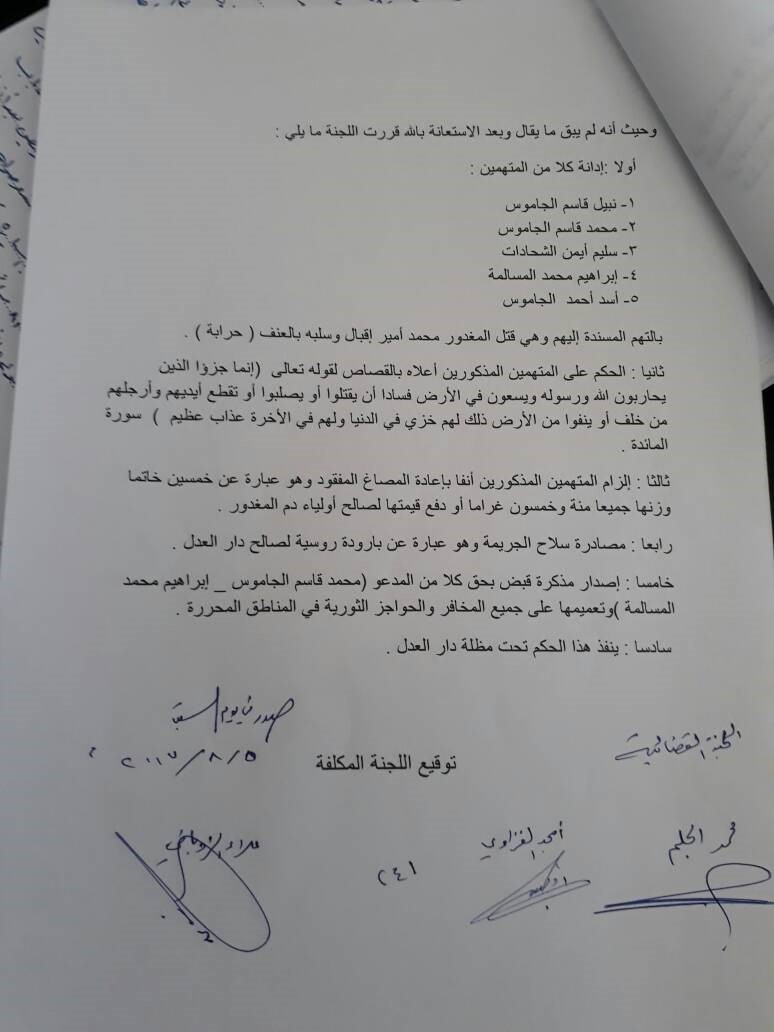
Image shows the death sentence issued by the courthouse in Horan on August 5, 2017, against the accused, Mohammad Jamous, Nabil al-Jamous and Salim ash-Shahadat, Ibrahim Massalmeh, and Assad Al-Jamous, who were convicted of killing Mohammed Iqbal
Photo Credit: the activist Abu al-Leith.
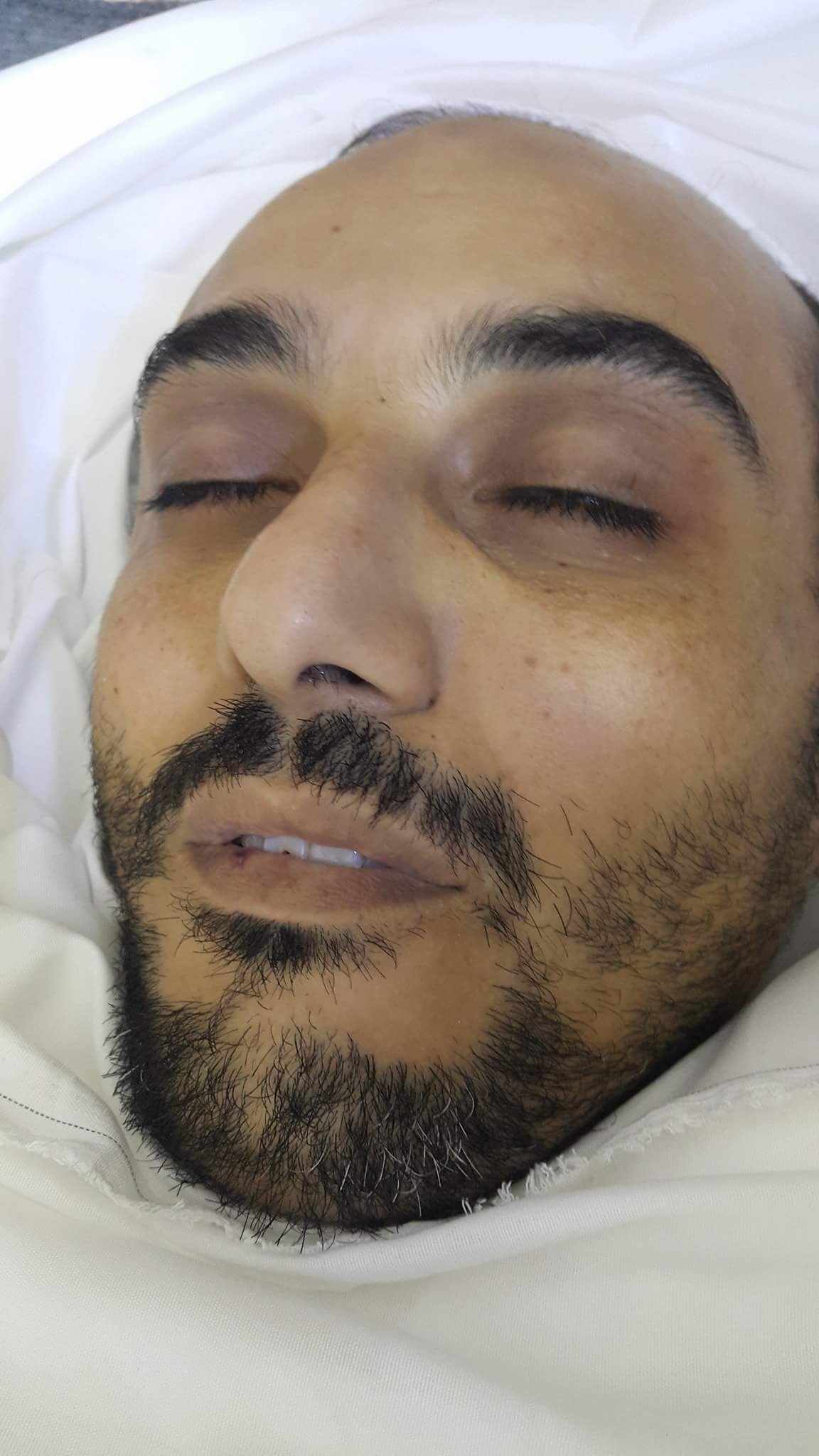
Image of the victim Mohammed Amir Suleiman Iqbal following his murder on July23, 2017. Several persons killed him in an attempt of theft.
Photo Credit: activists from Dael.
Fifth: Man killed his Brother in a Family Disrupt
The murder of Mohammed Iqbal coincided with a horrific crime near Jasim city on July 23, 2017, as the body of Ahmed Issa Abu-Ouja was found on the Jasim-Nawa Road. It was find out later that his brother identified as Hayl committed the crime following a family dispute between them, in this regard, Alaa Mahasna, the head of al-Thauri Police Station in Jasim said to Syrians for Truth and justice/STJ:.
“Ahmed, from Jassem, is the head of his family and a father of five children; he lived in his mother's home located in Nawa city. Ahmed had a criminal record in Nawa, with a 15-year sentence for a previous murder, but there is no power on earth that could arrest him given the corruption and nepotism spread in the courthouse in Horan . Moreover, there was a constant family dispute between him and his brother Hayl for different reasons; as there was a complaint, almost every month, from one of them against the other until things reached the fight limit.”
Alaa Mahasna added that on the evening July 23, 2017 when the victim was going to his farm, he received a phone call from his youngest brother who assured that a security patrol of the courthouse along with his brother Hayl were following him in order to arrest him. When Ahmed reached Jasim –Nawa Road, he was surprised by his brother Hayl riding a motorcycle, accompanied by no one, shot him and killed him at the spot. Mahasna continued saying:
“Subsequently, a security force affiliated to the courthouse in Horan arrested the perpetrator Hayl depending on the complaints that were filed between the two brothers. Indeed he immediately confessed killing his brother, but the sentence has not been pronounced so far, probably given the nepotism spread in the court.”
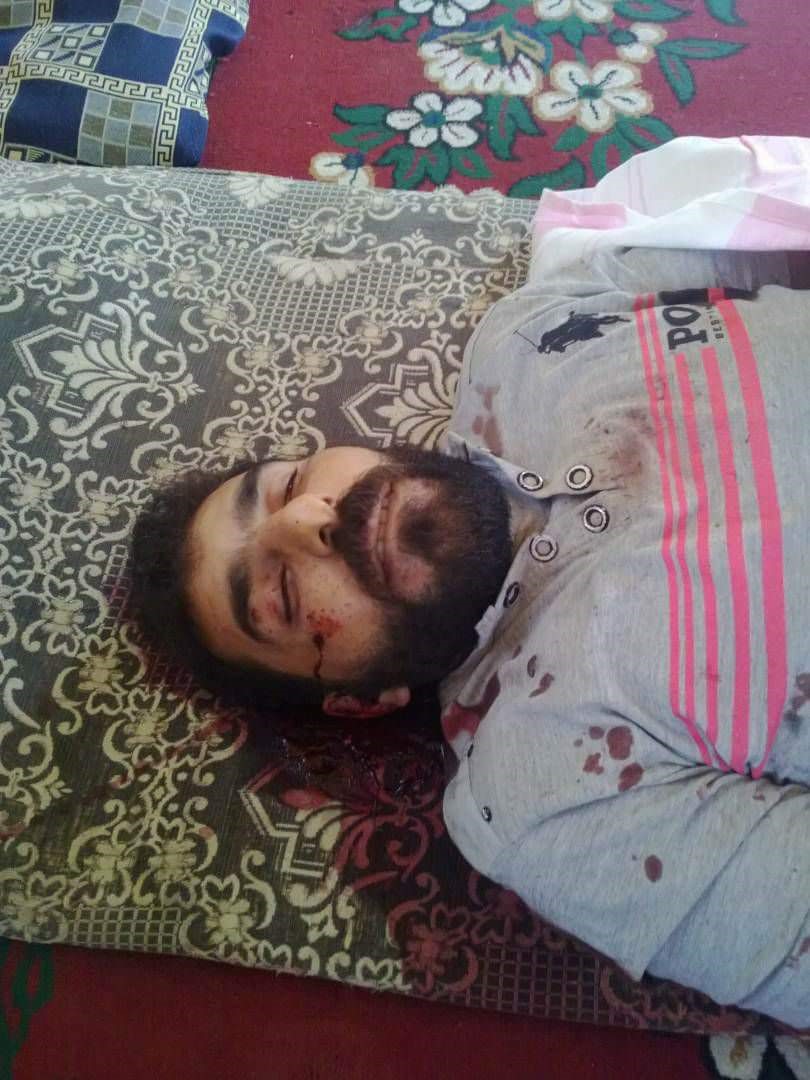
Image of the victim Ahmad Issa Abu-Ouja following his murder by his brother Hayl in a family dispute on July 23, 2017. Photo Credit: Activists from Jasim City.
Sixth: Killing Two young men accused of belonging to the Islamic State organization-ISIS
On July 22, 2017, bodies of two young men were found on Muzayrib-Tell Shihab Road in western countryside of Daraa; the bodies were subjected to several gunshots before being killed. Anyway, both of the victims, Ahmad al-Hashish and Yahiya al-Hashish, were abducted the day before the crime. The two young men were from tall Shihab and were relatives, according to the testimony of Ahmed al-Horani, an activist from Tell Shihab, who talked to STJ about the mysterious of this murder crime, he said:
“Too much talk was raised about the causes of murdering those victims, a year ago, there was a rape of a girl in our town, and her relatives investigated a suspect from the town and tortured him until he confessed his involvement in the rape incident, along with the first victim Ahmed al-Hashish. As For Yahiya al-Hashish, the second victim, many of his relatives were killed in similar murders last year, but after a short period, some information was posted on the social media reported that the two victims were affiliated to ISIS, but we are not sure of that until this moment.”
al-Horani noted that some alleged reports about association of both victims with the Islamic State organization, also known as ISIS, weren’t not based on any evidence given the two young men did not belong to any armed faction. Al-Horani also noted that in many killing incidents in Tell Shihab town, families of most of the victims were unable to take their rights despite having lodged complaints to the courthouse in Horan, and despite the court's knowledge of the perpetrators of those crimes. al-Horani pointed out that the courthouse in Horan would not succeed in discharging its duties professionally in the presence of clan and nepotism in Daraa.
al-Horani added that the courthouse funded financially a police station in Tell Shihab, and the weapons available with its members are from the opposition factions stationed in the town, but the station's performance was very weak. Since its foundation more than two years ago, the station was unable to arrest one single accused even in a robbery case.
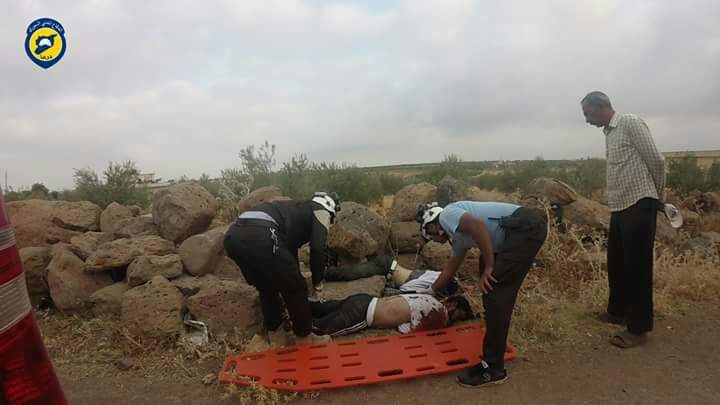
Image shows the victims, Ahmed al-Hashish and Yahiya al-Hashish, after finding their bodies on July 22, 2017, on the Muzayrib-Tell Shihab Road.
Photo Credit: the Facebook account for the Syrian Civil Defense in Daraa province.
Seventh: Proposed Recommendations
To the security and concerned authorities in Syrian armed opposition-controlled areas in Daraa:
Security actors and military factions of the armed opposition must assume their responsibility to reduce the recent widespread phenomenon of kidnapping and killings through many resolutions, some of them are:
1. Senior leadership of the armed opposition should condemn all human rights violations and breaches of International Humanitarian Law, including public and clear convictions for all abductions, enforced disappearances, arbitrary detentions, torture and other ill-treatment, as well as the use of cruel and degrading punishments, unfair trials and summary executions.
2. To instruct their followers that violation of International Humanitarian Law and International Human Rights Law should not be tolerated under any circumstances, and to make them aware of these principles and laws, and that the perpetrators will be prosecuted and held accountable.
3. To hold accountable all soldiers whom are involved in committing or directing violations of International Humanitarian Law- including possible war crimes- and of the provisions of International Human Rights Law.
4. To cooperate with independent and impartial investigations into violations of International Humanitarian Law, including the Independent International Commission of Inquiry mandated by the UN to investigate incidents in the Syrian Arab Republic, as well as the International, Impartial, Independent Mechanism IIIM, and the Syrian rights organizations. In addition to a prompt and unhindered access of humanitarian personnel to civilians in the areas under their control.
5. To install security points on the roads linking adjacent villages in Daraa and its countryside in order to protect civilians. If any person is arrested, the necessary procedures must be followed such as telling him the reason of his arrest, treating him in a non-degrading manner, and presenting him to the ad-hoc authority in a short time.
6. To attempt to limit the weapon to the hands that are aware of the responsibility and seriousness of its use, to punish those who seek it without a security license, and to establish a robust monitoring mechanism to investigate prior to transferring any weapons, ammunition or military equipment.
7. To restructure local security bodies to ensure that they are more consistent with the security requirements of the current phase.
8. To establish a joint security force designated to implement and support the decisions of the Court of Justice and unify its work at the district level (Dara province) and link its centers to local councils and to the Court of Justice. This independent security force should arrest those found guilty and responsible for any murder, abduction or drug trafficking.
9. To give a greater role and better funding to the security force designated for the Court of Justice as it is very weak compared to the existing opposition factions in Daraa, given the Court cannot bring any accused from any city unless it takes support from one of the factions in that city.
10. To adopt a unified civil judicial authority at the district level (Dara province) independent of local power interventions and their tensions. The Court of Justice in Horan should seek to ensure a minimum level of justice for the victims who have lost their children, particularly those who do not have any security immunity, to apply the law to all without exceptions with a view to strengthen the trust granted by the citizens, and to reduce the nepotism and clan spread in the Court so that it is qualified to resolve all issues of concern to the citizens of Daraa.
11. The Court of Justice in Horan should impose procedures to ensure: independence of judges and prosecution; application of fair trial guarantees, protection of witnesses, lawyers and judges and the investigator's ability to gather evidences. The Court should also seek to inform the victims and residents of Daraa of the latest efforts and judicial procedures in place to achieve accountability.
[1] A military junta composed of factions formed by the armed opposition, the most important of which is Firqat Fajr al-Islam and Mu'taz Bellah Group.
[2] November 2014, Military and civilian and relief authorities announced the formation of the courthouse in Horan, to be the only judicial body representing the judiciary in both Daraa and Quneitra, and abolition of all other courts of the armed factions. The courthouse is composed of several judges and is currently headed by the Ismat al-Absi, and is based on the Unified Arab Law as a reference in resolving the differences that are transferred to it.
[3] The most significant are: Liwa Omar al-Mukhtar, Liwa al-Fatah and Ahrar al-Sham al-Islamiyya.
[4] The most important factions were, Bani Umayyad Brigade/ Liwa Bani Umayya and Horan Mujahideen Brigade/ Liwa Mujahideen Horan

